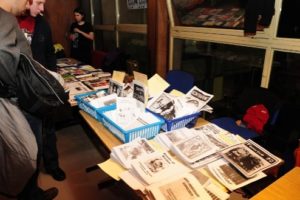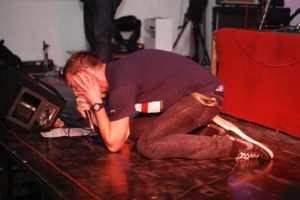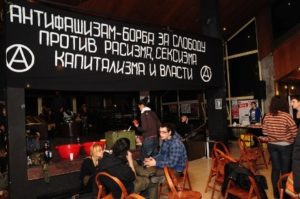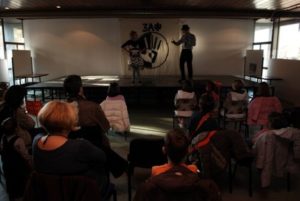Serbia, Zrenjanin, The statement of the participants of the Fifth Balkan anarchist bookfair
Over the last 30 years people in the Balkans have experienced brutality of war, nationalism, fascism and IMF policies – it has truly been a capitalist reconstruction at its finest. The need to transform the Balkans into a space of struggle, anti-nationalism and solidarity, concretely, starting now and from below, is obvious. It is this need that has brought us to Zrenjanin between 29-31 October 2010 for the 5th Balkan anarchist book fair [BAB]. We came from all over the Balkans, and beyond. We came with a shared understanding that BAB is a common space where local struggles are shared, communicated and supported, where experiences and analysis are exchanged, where alliances are being built and common projects developed on the basis of anti-authoritarianism, solidarity and respect.
Contrary to the prevailing belief that conflicts that have shaped our part of the world lately are some old remnants of the “19th century”, we think this is not the case. The Balkans are not the past, they are the future of Europe. The wars of the 1990s were not the “last wars of 19th century”, but the first clear manifestations of the destructive content of capitalist relations for the introduction of which those same wars have provided an invaluable cover. In the future the destructiveness of capital will manifest itself in different forms, much depending on local specificities, such as the existing or artificially created social divisions, but one thing is for sure: It will be brutal. It was the Balkans that were among the first targets of the first phase of the neoliberal attack of global capital: forms of collective activity that existed outside of capitalism were all but destroyed, under the banner of nationalism new separations were
succesfully installed. Parallel to that and hidden from view, conditions were systematically being established for the free reign of capital (from selling factories for land to installing Free Zones for investment to enabling companies “fast track” bypassing of regulations for their investment projects), creating new poverty in the process.
In order to be able to develop a working response today we need to understand what happened in the past. To understand the sudden emergence of nationalism and the horrors that it brought means also to understand the role the leading financial institutions played in this process, for an example through IMF policies of the time, for instance
in most Former Yugoslav countries, which are back for good – see today’s Greece. Much has indeed happened in the Balkans in the last thirty years, but all the particularities tell the story of the same general agenda pursued by the global financial institutions and implemented by their loyal local servants: to take away power from the people, and bring us all firmly under the regime of capital. The transformation of the Balkans into a zone of conflict and war was an early moment in a global capitalist war, that is now moving towards the rest of Europe.
The latest local example of brutal divisions that are being imposed on us all, and of how the attack against society is leaving people weakened and confused, is an incident just a couple of weeks ago in Belgrade during the Pride Parade. After more than twenty years of devastating economic and social crisis and destruction of the means of sustainability, we have seen people are still not fighting against those who are actually at the source of all this carnage. Instead, numerous fascist groups exist that are able to mobilize huge numbers of supporters for the purpose of lynching minority groups. Six thousand people participated in the attack on the Pride Parade, while at the same time the Belgrade Roma settlement was attacked by a petrol bomb. This latest manifestation of hate and aggression is a constitutive part of the new emerging capitalist regime. For us it has revealed in a very concrete way our common weaknesses and the incapability of social movements to resist meaningfully to the oppressive regime. The Pride
Parade has once again very clearly shown the necessity to organize our struggles differently, outside of the state and its proxies, and to establish spaces, structures, modes and channels of communication that remain autonomous, completely our own and where mutual aid is an everyday practice and understood as a tool of resistance. Working
towards this goal we express our commitment to forging comradeships and alliances in struggle and through struggle across the Balkans and to sharing our resources and experience in a concrete way.
BAB being a point of convergence, a lot of information was shared about the latest struggles, not only in the Balkans, but also about those that movements in the whole world are involved in. Among others, we were informed about the situation in Russia where activists are living in a situation of extreme tension and violence. With this statement we
also join our voice with comrades who called for international solidarity actions between 12th and 15th November 2010 in support of antifascist activists that are currently prosecuted in Russia for their contribution to the local ecological struggle.
Participants of 5th Balkan anarchist bookfair




